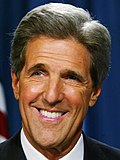| |||||||||||||||||||||||||
88 Democratic National Convention delegates (74 pledged, 14 unpledged) The number of pledged delegates received is determined by the popular vote | |||||||||||||||||||||||||
|---|---|---|---|---|---|---|---|---|---|---|---|---|---|---|---|---|---|---|---|---|---|---|---|---|---|
| |||||||||||||||||||||||||
 Election results by county John Kerry John Edwards | |||||||||||||||||||||||||
| Elections in Missouri |
|---|
 |
The 2004 Missouri Democratic presidential primary on February 3, 2004 determined the recipient of the state's 88 delegates to the Democratic National Convention in the process to elect the democratic nominee for president of the United States. It was an open primary. [1]


